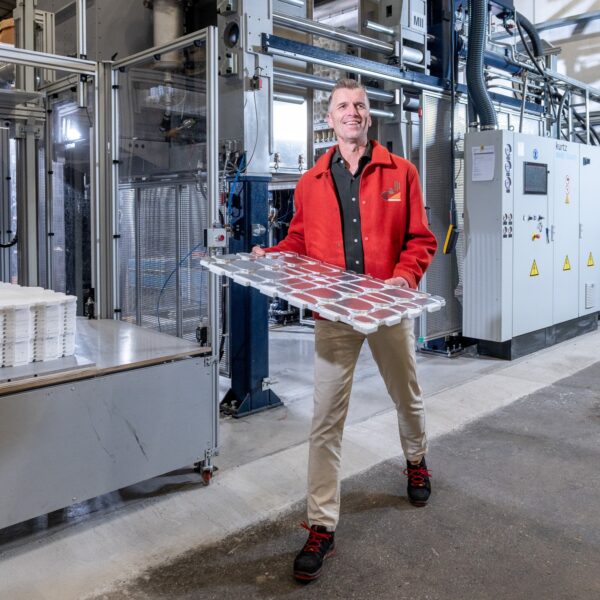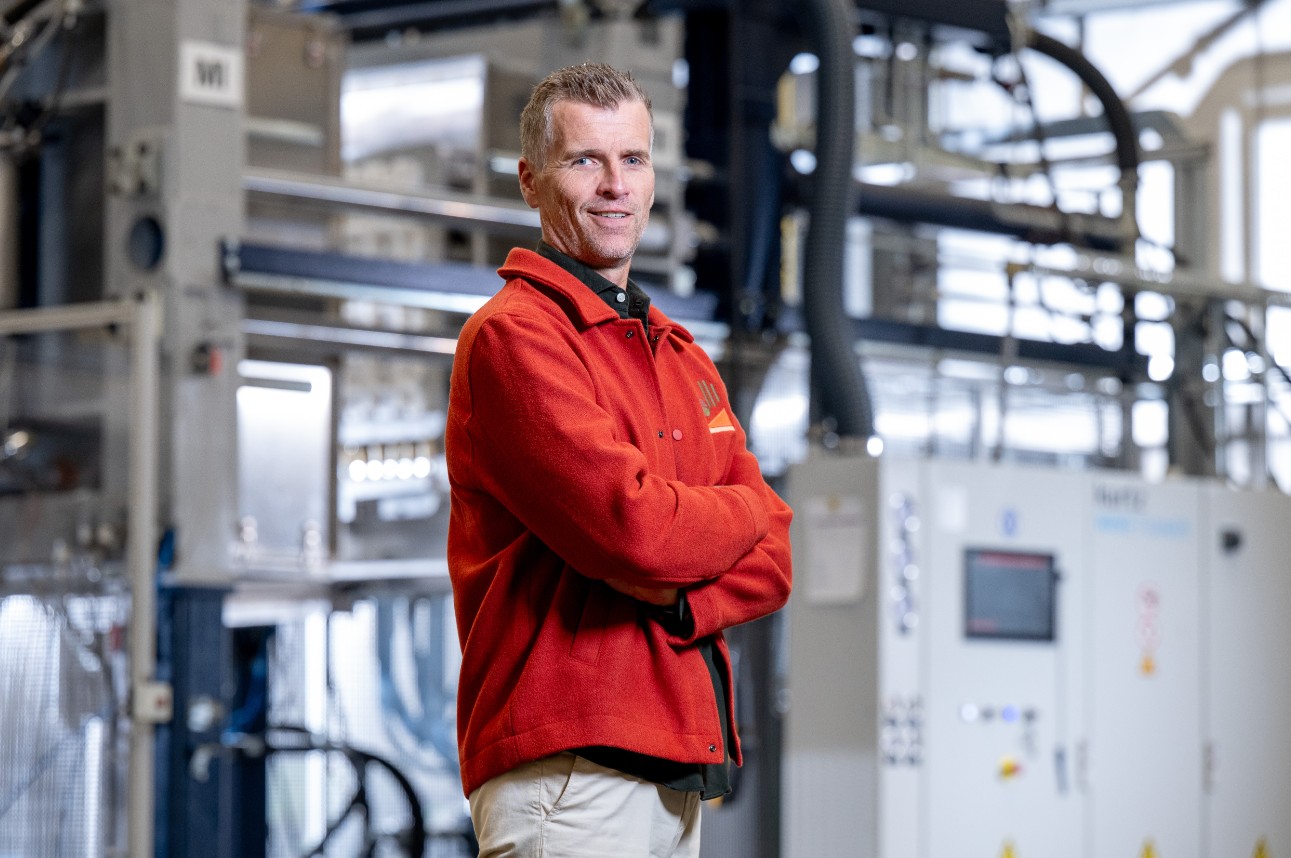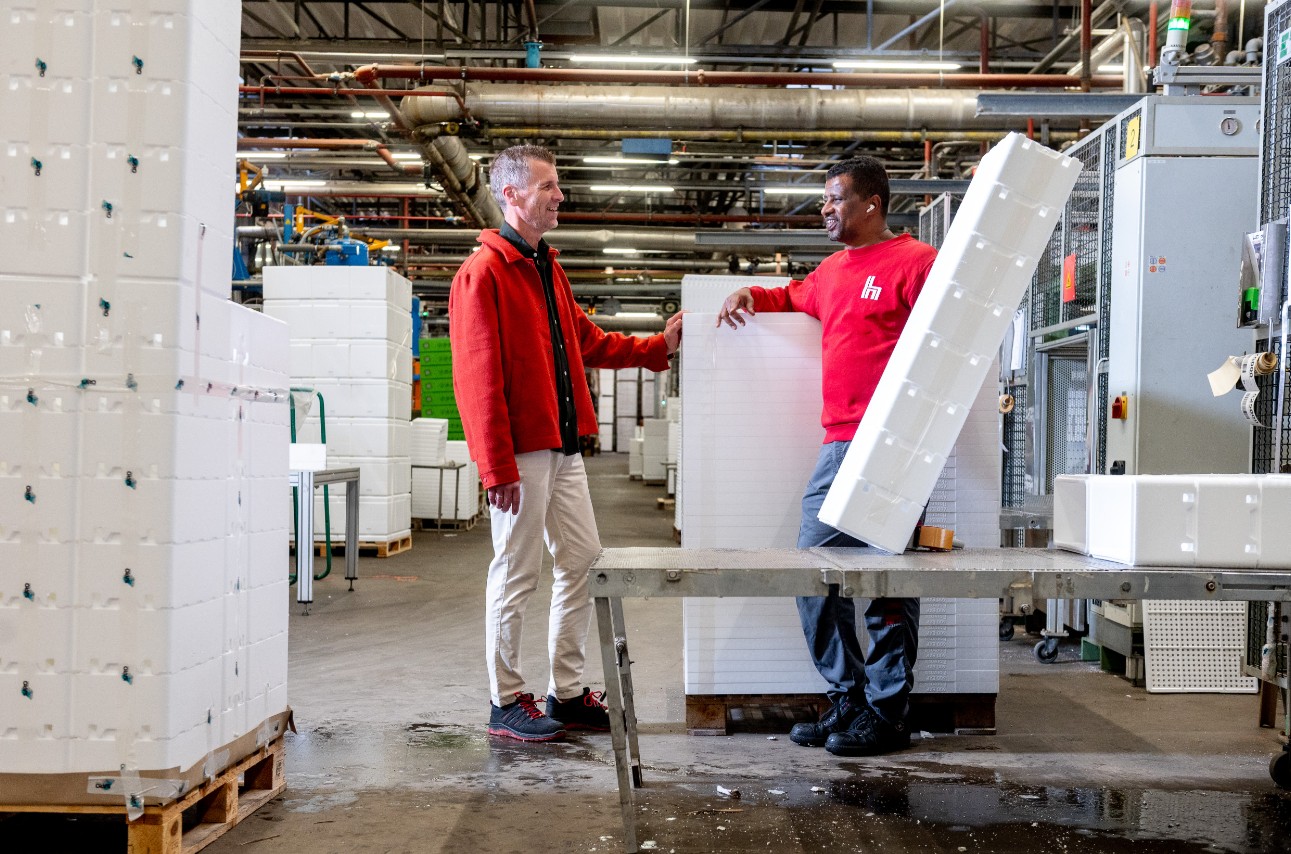SOURCE: TU Delft, Pioneering Tech
By Elise Spetter | Photography by Erno Wientjens | 4 November 2025
In Pioneering Tech, we follow SMEs that innovate together with TU Delft. Each story highlights their challenge, how the first contact came about, and the impact of the collaboration — plus how you can take the first step yourself. This episode features Hordijk, a family-owned company producing EPS products. “The collaboration with TU Delft accelerated our plans — although finding the right entry point wasn’t easy at first.”
In short
- Hordijk, a family business producing EPS (expanded polystyrene) products, is modernising its production with a wavefoamer: an electric technology that consumes less energy and processes more recycled material.
- The collaboration with TU Delft and YES!Delft sped up the innovation and sparked new ideas — from defence applications to reusing horticultural by-products.
- The lesson for other SMEs: cooperation with knowledge institutions requires persistence — “find the right entry point and don’t give up.”
“My name is Sander de Jager, and I’m Operations Manager at Hordijk.” I’ve been with Hordijk for about seven years. Here in Delft we employ around 35 people. The group has existed for over a century — we started with wood and later switched to plastics.
We produce items made from expanded polystyrene (EPS): the familiar white, lightweight foam blocks often used as packaging material to protect electronics or fresh produce during transport. EPS is also used as insulation in construction and as customised components in structural work, such as foundation boxes and floor parts.
The material is strong and insulating, and with our new production technology we can incorporate increasing amounts of recycled content while drastically reducing energy consumption.
“Students came up with fresh ideas — from defence applications to reusing horticultural residues” – Sander de Jager, Operations Manager
Sander de Jager – Operations Manager
At Hordijk, sustainability has been central for over a hundred years — we call it stewardship. We aim to use our resources responsibly and continuously look for ways to make our products more sustainable. Yet the production technology we had used for fifty years — steam production powered by gas — still offered room for improvement.
That’s why we connected with a German machine builder who had developed the wavefoamer. Instead of steam, this machine uses a high-frequency electric field — essentially like a microwave. It fuses the EPS beads together using much less energy and a higher proportion of recycled material.
We divided the project into two phases: Phase 1: Processing EPS with the new technology — same material, new process and recyclate. Phase 2: Processing other materials or biological by-products — that’s where the future lies.
How the contact began
For quite some time, I had tried to get in touch with TU Delft. I emailed the sustainability department, but the replies often stated that the university mainly focused on scientific research. I couldn’t seem to find the right way in.
The breakthrough came when Anske Plante from the Innovation & Impact Centre at TU Delft got involved. She was much more open to collaboration with companies, and from that moment things started to move. Together with YES!Delft and the Entrepreneurship Fund, we organised a challenge where students brainstormed applications for our new technology. It was truly inspiring. Two student teams developed and presented their ideas — their posters still hang in our office today.
TU Delft’s contribution
The contact with TU Delft gave us renewed energy to push forward with the new technology. Students brought fresh perspectives — ideas ranging from defence applications to using agricultural residues. For us, it felt like recognition. Professors and students were surprised to discover how innovative we are at Hordijk. It made our team proud to showcase what we do.
The collaboration was also valuable for our network: through TU Delft, we connected with new partners — even in markets we’d never have reached otherwise.
Impact on the company
The partnership opened doors to new ideas and new markets. Defence is one example: through TU Delft we connected with people working in that field, and we’re keeping that contact warm through our commercial director.
Beyond that, our network has expanded. We believe sustainability cannot be achieved alone — it always requires collaboration with partners: universities, consultants, machine builders, and customers.
In the coming years, we aim to fully master the new technology: first achieving 100 percent EPS recyclate, and later expanding to biological materials. We’re eager to continue working with TU Delft — for instance, there’s a proposal to host sixty Mechanical Engineering students for a site tour. We’re also in touch with Aerospace Engineering (L&R), where we see further opportunities for joint innovation.
Challenges and lessons learned
The collaboration went well, though not everything was smooth. Recruiting students proved difficult — not everyone who signed up showed up, and we couldn’t offer academic credits. Still, the event generated lots of positive energy, and follow-up projects emerged.
For example, students conducted an energy-consumption analysis that now helps us move forward. A master’s student from Aerospace Engineering was set to research new materials on the wavefoamer, but her schedule didn’t allow it in the end. The important thing is that the connections exist — that’s what matters most to us.
What TU Delft can learn
We’ve learned a lot from TU Delft, but perhaps the university can also learn from us. Sometimes TU Delft can feel like a closed community. In business, collaboration and openness are essential — without them, you won’t succeed. True creativity only emerges through interaction.
We contribute practical experience and an international network, including in Germany. Together, we can not only develop new technologies but also bring them into real-world application.
“My advice? Find the right entry point and don’t give up. It can take time to reach the right person, but it’s worth it. Thanks to TU Delft, we’ve gained new ideas, a larger network, and access to markets we’d never considered before.”



